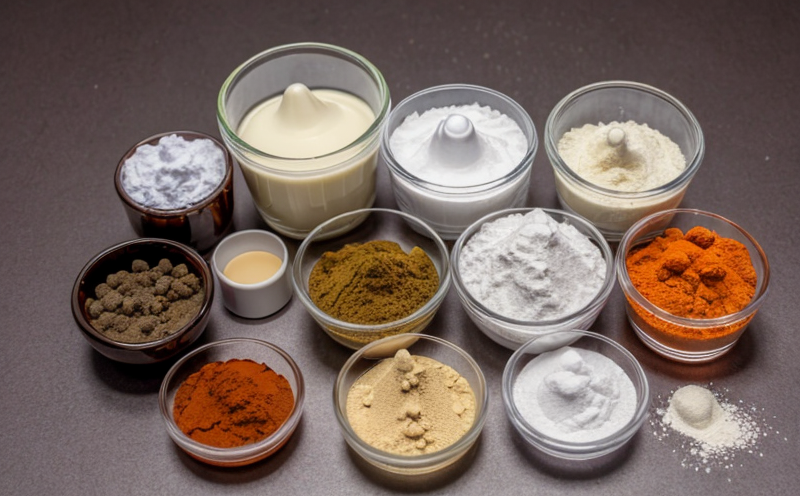Natural Excipient Biodegradability Testing
In the pharmaceutical sector, excipients play a critical role in ensuring that drug formulations are safe and effective. Among these essential components, natural excipients are increasingly favored for their perceived environmental friendliness and compatibility with human physiology. However, not all natural excipients are created equal when it comes to biodegradability. Ensuring the appropriate degradation of excipients is crucial for minimizing environmental impact post-disposal.
Biodegradability testing for natural excipients evaluates how quickly these materials can break down in different environments such as soil, water, or compost. This process helps pharmaceutical companies comply with regulatory standards and ensure that their products are environmentally responsible throughout the product lifecycle.
The testing procedure involves exposing samples of the excipient to controlled conditions designed to mimic real-world scenarios for degradation. These tests typically follow international standards like ISO 17543 and ASTM D5983, which provide standardized protocols for measuring biodegradation rates under specific environmental conditions.
One common approach is through soil or water incubation tests where the excipient sample is placed in controlled environments that simulate natural degradation processes. The rate of breakdown can then be measured over time by assessing changes in mass, chemical composition, and microbial activity around the sample.
The importance of accurate biodegradability testing cannot be overstated. It directly influences several aspects including environmental compliance requirements, product safety assessments, and sustainable manufacturing practices. By understanding exactly how quickly an excipient will decompose post-use, manufacturers can better predict its impact on ecosystems and design more sustainable products.
For instance, certain natural excipients may degrade rapidly in compostable conditions but not as efficiently under standard landfill conditions. This information is vital for ensuring that the overall sustainability goals of a pharmaceutical company are met without compromising product efficacy or safety.
In addition to compliance with environmental regulations, biodegradability testing also supports broader sustainability initiatives within the industry. As consumer awareness about eco-friendly products grows, demonstrating responsible use of natural excipients becomes increasingly important for brand reputation and market competitiveness. By providing robust data on degradation rates and potential impacts, laboratories like ours offer valuable insights that help guide decision-making towards more sustainable practices.
Our comprehensive biodegradability testing services go beyond mere compliance; they provide actionable intelligence that supports ongoing innovation in pharmaceutical formulations. Whether you're developing new excipients or optimizing existing ones for better performance and sustainability, our expert team can deliver precise results tailored to your specific needs.
Quality and Reliability Assurance
At the heart of any successful pharmaceutical operation lies a robust quality assurance (QA) framework. When it comes to natural excipients, biodegradability testing is just one component of this broader effort. Ensuring that each batch meets stringent standards not only enhances product reliability but also protects consumer health and safety.
Our QA processes integrate multiple layers of control from raw material sourcing through final formulation stages. For biodegradability testing, we employ advanced analytical techniques such as gas chromatography-mass spectrometry (GC-MS) for precise mass measurements and microbial fuel cell technology to monitor degradation rates over time.
By leveraging cutting-edge instrumentation and rigorous method development, we maintain the highest levels of accuracy and precision. This commitment to excellence extends beyond individual tests; it encompasses every aspect of our service offering—from initial consultation through final report delivery.
We also adhere strictly to relevant international standards such as ISO 17543 for soil biodegradation testing and ASTM D5983 for aquatic systems, ensuring consistency across all projects. Our proficiency in these areas allows us to deliver reliable data that can be confidently relied upon by regulatory bodies and internal stakeholders alike.
In addition to technical excellence, we prioritize transparency throughout the process. Clients receive detailed documentation outlining every step of their biodegradability test, including raw data and interpretation thereof. This level of openness fosters trust between partners while simultaneously empowering them with valuable insights into product performance.
Our dedication to quality is further exemplified by our commitment to continuous improvement. Regularly updating methodologies based on the latest scientific advancements ensures that we remain at the forefront of this rapidly evolving field. By staying ahead of trends, we ensure that our clients benefit from state-of-the-art testing solutions that meet current and future regulatory expectations.
Customer Impact and Satisfaction
- Enhances product safety and environmental friendliness through rigorous testing protocols
- Supports compliance with international standards and local regulations
- Facilitates informed decision-making regarding excipient selection for sustainable products
- Promotes trust among stakeholders by providing transparent, reliable test results
Use Cases and Application Examples
Beyond mere compliance, biodegradability testing plays a crucial role in driving innovation within the pharmaceutical industry. Here are some key applications:
- Development of Green Formulations: Ensures that new excipients meet stringent environmental standards while maintaining desired physicochemical properties.
- Sustainable Manufacturing Practices: Helps identify optimal excipient sources and processing methods to minimize waste generation during production cycles.
- Product Lifecycle Management: Allows companies to plan disposal strategies effectively, reducing risks associated with improper handling of hazardous materials.





